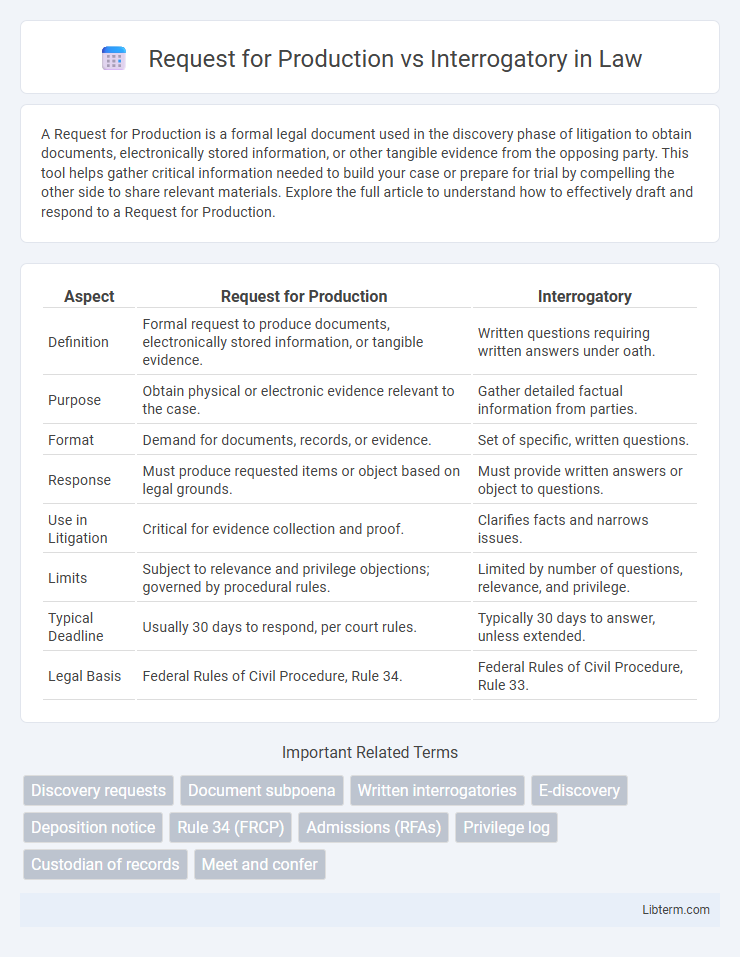A Request for Production is a formal legal document used in the discovery phase of litigation to obtain documents, electronically stored information, or other tangible evidence from the opposing party. This tool helps gather critical information needed to build your case or prepare for trial by compelling the other side to share relevant materials. Explore the full article to understand how to effectively draft and respond to a Request for Production.
Table of Comparison
| Aspect | Request for Production | Interrogatory |
|---|---|---|
| Definition | Formal request to produce documents, electronically stored information, or tangible evidence. | Written questions requiring written answers under oath. |
| Purpose | Obtain physical or electronic evidence relevant to the case. | Gather detailed factual information from parties. |
| Format | Demand for documents, records, or evidence. | Set of specific, written questions. |
| Response | Must produce requested items or object based on legal grounds. | Must provide written answers or object to questions. |
| Use in Litigation | Critical for evidence collection and proof. | Clarifies facts and narrows issues. |
| Limits | Subject to relevance and privilege objections; governed by procedural rules. | Limited by number of questions, relevance, and privilege. |
| Typical Deadline | Usually 30 days to respond, per court rules. | Typically 30 days to answer, unless extended. |
| Legal Basis | Federal Rules of Civil Procedure, Rule 34. | Federal Rules of Civil Procedure, Rule 33. |
Introduction to Discovery in Litigation
Request for Production and Interrogatories are fundamental tools in the discovery phase of litigation used to obtain evidence from the opposing party. A Request for Production seeks tangible items such as documents, electronic records, or other physical evidence relevant to the case, while Interrogatories consist of written questions that require formal written answers under oath. Both methods serve to clarify facts, identify witnesses, and narrow down issues before trial, ensuring a thorough and efficient exchange of information.
Understanding Requests for Production
Requests for Production are formal legal documents used in the discovery phase to obtain tangible evidence such as documents, electronic files, or physical items relevant to a case. They differ from Interrogatories, which require written answers to specific questions, by focusing on the submission of actual materials that support claims or defenses. Understanding Requests for Production is essential for gathering critical evidence and building a strong legal strategy based on concrete documentation.
What Are Interrogatories?
Interrogatories are written questions submitted by one party to another in a legal case, requiring written answers under oath. They serve as a discovery tool to gather detailed information, clarify facts, and identify key issues before trial. Unlike Requests for Production, which demand documents or tangible evidence, Interrogatories focus solely on obtaining narrative responses and factual details.
Key Differences Between Requests for Production and Interrogatories
Requests for Production require a party to provide physical documents, electronic files, or tangible evidence relevant to the case, emphasizing the disclosure of concrete materials. Interrogatories consist of written questions that must be answered under oath, focusing on obtaining detailed factual information and admissions. The key difference lies in the nature of information exchanged: Requests for Production deliver documentary evidence, whereas Interrogatories extract verbal or narrative responses.
Legal Standards Governing Discovery Tools
Request for Production and Interrogatories are governed by the Federal Rules of Civil Procedure, specifically Rules 33 and 34, which outline the scope and limitations of discovery tools in civil litigation. Requests for Production compel parties to provide tangible evidence such as documents, electronic files, and physical items relevant to the case, while Interrogatories require written answers to specific questions under oath, facilitating fact-finding and clarification. Legal standards emphasize proportionality, relevance, and privilege protections to balance thorough discovery with protecting sensitive information and preventing undue burden.
Advantages of Requests for Production
Requests for Production offer the advantage of obtaining tangible evidence such as documents, electronically stored information, and physical items, which provide direct proof relevant to the case. These requests allow for detailed inspection and copying of evidence, facilitating thorough analysis and stronger case preparation. In comparison to interrogatories, Requests for Production reduce reliance on written answers and enable more objective verification through physical or digital materials.
Benefits of Using Interrogatories
Interrogatories streamline the discovery process by providing clear, written responses to specific questions, enabling parties to obtain factual information efficiently. They help narrow issues before trial, reducing the scope of depositions and costs associated with gathering evidence. Interrogatories also create a formal record useful for summary judgment motions and trial preparation, enhancing case strategy.
Common Challenges and Objections
Request for Production often faces challenges related to the volume and relevance of documents, leading to objections about undue burden and overbreadth. Interrogatories commonly encounter objections based on vagueness, ambiguity, or the requirement to provide information not readily available. Both discovery tools frequently prompt disputes over confidentiality, privileged information, and proportionality in relation to the case scope.
Best Practices for Drafting Discovery Requests
When drafting discovery requests, clarity and specificity are paramount to avoid objections and ensure compliance; requests for production should clearly describe the exact documents or categories of documents sought, while interrogatories must frame precise, concise questions to elicit relevant information. Utilize definitions and instructions consistently to establish scope, and tailor each request to the case's key issues while avoiding overly broad or burdensome demands. Collaborate with legal standards such as the Federal Rules of Civil Procedure to balance thoroughness with proportionality, increasing the likelihood of obtaining useful and admissible evidence.
Conclusion: Choosing the Right Discovery Method
Request for Production targets physical evidence and documents, making it ideal for gathering tangible proof in litigation. Interrogatories focus on obtaining detailed written answers to specific questions, useful for clarifying facts and narrowing issues. Selecting the appropriate discovery method depends on the nature of the information sought, with a strategic combination often enhancing case preparation and litigation efficiency.
Request for Production Infographic

 libterm.com
libterm.com